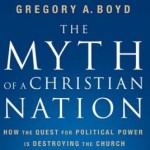We run our website the way we wished the whole internet worked: we provide high quality original content with no ads. We are funded solely by your direct support. Please consider supporting this project.
In your Anabaptist view, should Christians get involved in politics at all? Do you think they should even vote?
Ultimately, each person must follow their conscience when it comes to whether or not they vote, how they vote if they decide to vote, and the extent to which they should involve themselves in the political system. But we must always remain aware of the dangers involved in participating in the political system, for it is under the strong influence of Satan (Lk 4:5-7; 1 Jn 5:19). The political system will always try to lure us into believing that our particular way of doing politics is the “Christian” way and tempt us into placing our trust in (what we think is) the wisdom and righteousness of our political positions rather than in the power of self-sacrificial love.
When Christians begin to think this way, it inevitably divides the church, since the ambiguity of politics is such that on most issues, good and decent people can and do disagree. If I naively pronounce that my views are the “Christian” views, then your views must be judged to be “un-Christian” if they disagree with me. This is arrogant and naive. It’s also unbiblical. Jesus called both Matthew, a tax collector, and Simon, a Zealot, to be his disciples. Tax collectors and zealots were at opposite sides of the political spectrum in the first century. Yet we don’t read a word in the Gospels about whose views Jesus thought were most correct, for the Kingdom he came to establish is “not of this world” (Jn 18:36).
Even more importantly, when followers of Jesus get co-opted by the political system it distracts us from the Kingdom work we’re called to do. To the extent that we place our trust in exercising power over others, we stop trusting our mandate to exercise power under others through sacrificial service. Paul warns us not to get too involved in the affairs of the world, including its politics, but to always focus on pleasing our commander (2 Tim. 2:4). Our commander tells not to trust the “power over” mentality that politics exercises, but to instead follow his example of exercising power under people by loving and sacrificing for them.
We who follow Jesus must always remember we belong to a radically different country with a radically different King who offers radically different solutions to the problems of life. We are missionaries in whatever earthly kingdom we happen to find ourselves in. We are citizens of heaven before we’re citizens of any earthly kingdom (Phil. 3:20). It’s therefore unwise and unbiblical for us foreigners to think it our job to try to run the government of this alien land.
Whether our mission field happens to be democratic, socialistic, communistic, totalitarian or libertarian makes no difference. We’re to keep our focus on carrying out the will of our Lord. We’re to obey laws insofar as they’re consistent with our Kingdom call and to disobey them insofar as they’re not (Ac 5:29) — all the while being willing to graciously suffer the consequences of doing so (I Pet 2:13-25). We’re to pray for our leaders and sacrificially serve our neighbors. But we must never buy into the world’s “power-over” way of solving social problems.
So follow your conscience on political participation, but be careful, and never put your trust in it.
Category: Q&A
Tags: Politics, Q&A, Social Issues
Topics: Ethical, Cultural and Political Issues
Related Reading

What’s the significance of Acts 17:26-27?
This passage is frequently cited by determinists, for Paul here states that God “marked out” the “appointed times in history and the boundaries” of nations (Ac. 17:26). This doesn’t entail omni-control on God’s part, however. It only entails that God is involved in setting temporal and geographical parameters around nations. Moreover, nothing suggests that God…

What is the significance of Jeremiah 36:1-6
The Lord has Jeremiah write his prophecy on a scroll, telling him, “Perhaps when the people of Judah hear about every disaster I plan to inflict on them, they will each turn from their wicked ways; then I will forgive their wickedness and their sin” (Jer. 36:3). Jeremiah then tells his scribe to take the…

How do you respond to the book of Revelation?
“The revelation of Jesus Christ, which God gave him to show his servants what must soon take place…” (1:1). Because many modern evangelical readers consider almost everything in the book of Revelation to be a sort of “snap shot” about what shall occur at the end of history, it will prove more beneficial to deal…

Answering an Objection to a Cross-Centered Approach to Scripture
Through Greg’s Facebook and Twitter, we’ve been getting some great feedback and questions regarding his cross-centered approach to Scripture. Several have voiced questions similar to the reader’s (below), so we thought it would be helpful to post Greg’s answer here on his blog.

“…citizens of the kingdom of God need to take care to distinguish…” [Quotes]
“…citizens of the kingdom of God need to take care to distinguish between their core faith and values on the one hand and the particular way they politically express their faith and values on the other.”

How do you respond to Zechariah 12:10?
“when they look on the one they have pierced, they shall mourn for him…” Hundreds of years before Christ was born it was declared that he would be pierced (cf. John 19:24–27). Detailed prophecies such as this one help convince us that Jesus is the Messiah hoped for in the Old Testament. The ministry and…
